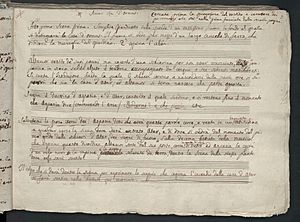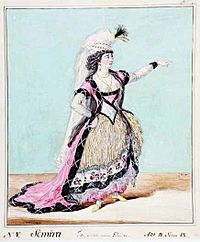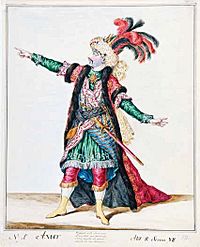Axur, re d'Ormus facts for kids
Quick facts for kids Axur, re d'Ormus |
|
|---|---|
| by Antonio Salieri | |

Page from the manuscript
|
|
| Librettist | Lorenzo Da Ponte |
| Language | Italian |
| Premiere | 8 January 1788: Burgtheater, Vienna |
Axur, re d'Ormus (meaning "Axur, King of Ormus" in Italian) is an opera by Antonio Salieri. An opera is a play where the story is told mostly through singing. The words for the opera, called the libretto, were written by Lorenzo Da Ponte. Axur is actually the Italian version of Salieri's earlier French opera, Tarare, which came out in 1787.
Contents
The Story of Axur
The story takes place in the ancient kingdom of Ormus, located in the Persian Gulf. The king, Axur, is a powerful ruler.
Axur's Deception
King Axur wants Aspasia, who is the wife of Atar. Atar is a brave soldier and the leader of Axur's army. Axur orders one of his soldiers, Altamor, to secretly take Aspasia away. Atar doesn't know who kidnapped his wife. He thinks an enemy from another country might have taken her. Atar goes to King Axur and asks for help to find Aspasia. Axur pretends to be helpful and tells Atar he can take a ship to search for his wife.
The Truth Comes Out
Before Atar leaves, a slave who works for Axur, named Biscroma, tells Atar the truth. Biscroma reveals that King Axur himself kidnapped Aspasia. The king has hidden her in the royal harem, which is a special part of the palace where women live.
A Nation in Danger
Soon after, enemy armies threaten to attack Ormus. The people of Ormus are scared and beg Atar to lead their army and save them. But King Axur tries to make Atar look bad. He tells the people that Atar has more important things to do than lead the army. Atar gets very angry. He declares that he is ready to lead the army and defeat the enemies of Ormus.
A Secret Plan
While a big feast is happening before the battle, Biscroma helps Atar. Biscroma disguises Atar as a person from Nubia and sneaks him into the harem. King Axur finds "the Nubian" in the harem. He doesn't realize it's Atar. Axur decides to punish Aspasia for supposedly being unfaithful to Atar. He plans to make her marry "the Nubian."
The King's Downfall
But Axur changes his mind. Instead, he sends soldiers into the harem to kill "the Nubian." The soldiers soon discover that "the Nubian" is actually Atar, their general. They decide not to kill Atar because their orders were only to kill "the Nubian." However, they do have orders to arrest Atar, so they bring him before the king.
Atar is brought into the court while Axur is trying to charm Aspasia. Atar and Aspasia are very happy to see each other and hug. Axur is furious. He sentences Atar to death for entering the royal harem without permission. Atar is taken away to be executed.
But a large crowd gathers around the palace. They demand that Atar be set free so he can save their country. King Axur realizes that the people no longer love or support him. He takes off his crown and dies. The people then declare Atar the new King of Ormus.
Opera Performances
Axur was first performed at the Burgtheater in Vienna on January 8, 1788. The main role of Axur was sung by Francesco Benucci, who was a famous singer. This opera became one of the most well-known operas in Vienna.
A small part of Axur is shown in the 1984 movie Amadeus. However, the movie shows Axur being performed earlier than it actually was. It also shows it before the death of Mozart's father, Leopold Mozart, which is not correct. Also, a short part of the song "Son Queste Le Speranze" from the opera appears at the beginning of the film.
Main Characters
| Role | Voice type | First Performed, January 8, 1788 Conductor: Antonio Salieri |
|---|---|---|
| Axur, King of Ormus | baritone | Francesco Benucci |
| Arteneo, High Priest of Brahma | baritone | Francesco Bussani |
| Altamor, a soldier, Arteneo's son | bass | Lodovico Trentanove |
| Atar, a soldier | tenor | Vincenzo Calvesi |
| Aspasia, Atar's wife | soprano | Luisa Laschi-Mombelli |
| Biscroma, a slave | Bass/Baritone | Stefano Mandini |
| Fiammetta, Biscroma's wife | soprano | Teresa Calvesi |
| Elamir | soprano | Franziska Distler |
| Urson, a soldier | bass | Niccolò Del Sole |
| A slave | bass | |
| Arlecchino | tenor | |
| Smeraldina | soprano | |
| Brighella | baritone | |
| Slaves, soldiers, priests of Brahma, people | ||
Recordings of Axur
In 1989, a full recording of the opera was made. It featured Andrea Martin as Axur and Curtis Rayam as Atar. The recording was done by the Russian Philharmonic Orchestra and conducted by René Clemencic.
In 1984, Sir Neville Marriner recorded two parts from Axur, re d'Ormus for the movie Amadeus. These included the song "Son queste le speranze" and the final part of the opera. The singer was Suzanne Murphy, and the music was played by the Academy of St Martin in the Fields.
See also
 In Spanish: Axur, rey de Ormuz para niños
In Spanish: Axur, rey de Ormuz para niños



